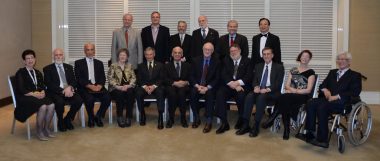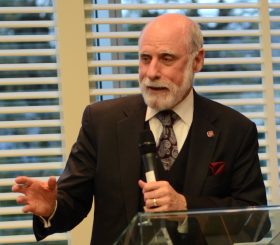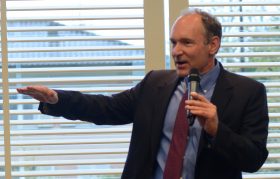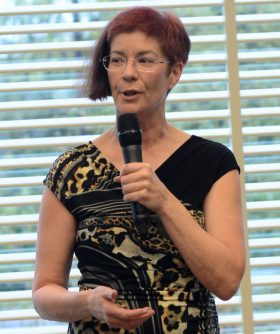Journalism team covers historic induction ceremony with tech pioneers in Switzerland.

A 12-person team from the School of Communications Imagining the Internet Center provided extensive stories, photos and videos featuring the inaugural class of the Internet Society’s Internet Hall of Fame.
Seventeen of the inductees were honored April 23 in Geneva, Switzerland, and Elon students had the opportunity to record their stories as a historic record of the pioneers who created the global Internet.
Primary coverage of the Hall of Fame induction ceremony was coordinated by Caitlin O’Donnell ‘13, working with Janna Anderson, associate professor of communications. The team also provided comprehensive photo and video coverage of the remarks by each inductee.
The Imagining the Internet story on the Hall of Fame is at: http://www.elon.edu/e-web/predictions/isoc_20th_2012/internet_hall_of_fame.xhtml
Among those who were on hand for the ceremony were the following:

Vint Cerf, who is recognized as one of the “fathers of the Internet.” He co-authored the TCP/IP protocols and the architecture of the Internet. He worked as part of the UCLA team that developed the first Internet nodes. For many years since he has been a global ambassador for the Internet, continuing his leadership in IETF and ISOC. He now serves as Chief Internet Evangelist for Google.
Leonard Kleinrock, who pioneered the mathematical theory of packet networks and led the team that sent the first message on the Internet. He developed ARPANET and his UCLA lab was the first node in the network.
John Klensin, who began his involvement with Internet Protocols in 1969 when he worked on the File Transfer Protocol. He and fellow inductee Randy Bush created the Network Startup Resource Center that helped countries establish connections globally.

Tim Berners-Lee, inventor of the World Wide Web and leader of the World Wide Web Consortium – W3C. His Web standards organization continues to make the Web more functional, to connect more people in more ways. His World Wide Web Foundation is helping the Web’s outreach across the globe.
Steve Crocker, who was the initiator of the Request for Comment series of notes through which protocol designs are documented and shared, authoring the very first RFC. He is the chair of the board of the Internet Corporation for Assigned Names and Numbers, and an active Internet leader in technical, social and political respects.
Lawrence Landweber, whose TheoryNet was a 1970s email system. In 1979 he founded the CSNET to connect all US university and industrial computer research groups; the network had more than 180 members by 1984. He established the first network gateways between the US and other countries and educated people internationally through his global networking workshops.

Mitchell Baker, a founding leader of the Mozilla Foundation and the Mozilla Corporation, one of the first employees of Netscape, and a leading developer and supporter of the open source movement.
The multimedia reporting team for Imagining the Internet at the Internet Society’s 20th Anniversary Global INET Conference included the following Elon University students, faculty, staff and friends: Jacquie Adams, Dan Anderson, Janna Anderson, Kacie Anderson, Nicole Chadwick, Jeff Flitter, Addie Haney, Brandon Marshall, Brian Meyer, Caitlin O’Donnell, Rachel Southmayd and Rebecca Smith.
About the Internet Hall of Fame
The Internet Hall of Fame is an annual awards program that has been established by the Internet Society to publicly recognize a distinguished and select group of leaders and luminaries who have made significant contributions to the development and advancement of the global Internet. More information on the program can be found at www.internethalloffame.org.
About the Internet Society
The Internet Society is the trusted independent source for Internet information and thought leadership from around the world. With its principled vision and substantial technological foundation, the Internet Society promotes open dialogue on Internet policy, technology, and future development among users, companies, governments, and other organizations. Working with its members and Chapters around the world, the Internet Society enables the continued evolution and growth of the Internet for everyone. For more information, see: http://www.internetsociety.org


